March 15, 2016
The survey was sent to roughly 1000 Japanese journalists registered with The Genron NPO during the period of February 28 through March 9. Responses were received from 56 people.
Participants were asked to consider how Japan's ability to communicate its opinions in global society today compares with ten years ago. Half (50%) thought it had decreased or somewhat decreased. Also related to Japan's ability to communicate abroad, when asked to consider whether or not the situation in Japan and Asia was accurately conveyed abroad, 44.6% of participants felt that the situation was inaccurately (10.7%) or somewhat inaccurately (33.9%) conveyed.
The survey results also showed that many people view how Japan is depicted in international media unfavorably. 26.8% believed there were some misunderstandings in the information about Japan abroad, and 8.9% believed that the image of Japan in international media was biased. It was also revealed that, more than the United States (48.2%), China (80.4%) and Japan (62.5%) are looked to to take leadership in establishing a system of peace in Northeast Asia.
Detailed survey results follow below.
Half of journalists feel that Japan's communicative ability has decreased over the last ten years
First, Japanese journalists were asked to consider, "How do you feel about Japan's ability to communicate in global society today as compared to ten years ago?" Survey results revealed that many Japanese journalists believe that Japan's ability to convey its opinions and ideas to the international community has decreased. A total of 50% of the participants felt that it had decreased. More specifically, 12.5% answered "it has decreased" and 37.5% answered "it has somewhat decreased." Conversely, none of the participating journalists felt that "it increased," and only 16.1% believed that Japan's communicative ability had "somewhat increased."
However, 32.1% of participants felt that Japan's communicative ability had neither increased nor decreased over the past ten years. In addition, several participants were unable to judge this issue.
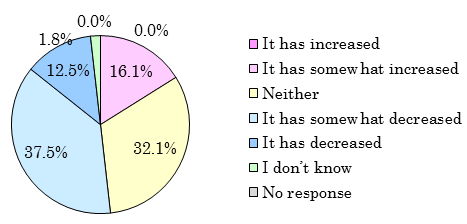
Over 60% of Japanese journalists believe that Japan has become more inward-looking and its international presence has decreased
Participants that answered "it has decreased" or "it has somewhat decreased" in the previous question were asked why they believed Japan's communicative ability had decreased. As the most common responses, both "The presence of Japan in world affairs has decreased" and "Japan has become reluctant to act, and it has little interest in world affairs" were given as reasons by 62.1% of participants.
On the other hand, only 24.1% felt that "The Japanese media are is more and more focused on domestic issues" was the reason. Only 31.0% selected "The Japanese government has poor little interest in facing world issues."
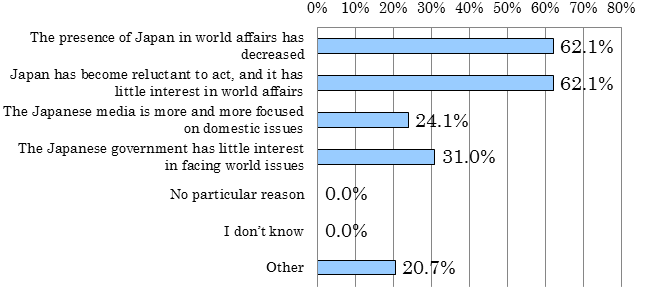
Nearly half of journalists believe that information about Japan is not accurately conveyed to the world
When asked to consider whether or not the situation in Japan and Asia was accurately conveyed abroad, 44.6% of participants felt that the situation was inaccurately (10.7%) or somewhat inaccurately (33.9%) conveyed. In other words, nearly half of Japanese journalists felt that information about the true situation in Japan and Asia was not being accurately conveyed to the rest of the world. Conversely, hardly more than 10% of the participants felt that information about Japan and Asia was being conveyed accurately. No journalists felt that information was "accurately conveyed" and only 12.7% answered "somewhat accurately."
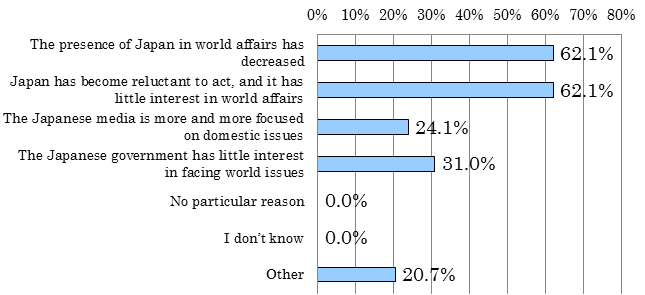
A fundamental dispute with international media: nearly 40% believe there are "misunderstandings" or "bias"
Next, when asked about information about Japan in international media, the largest group of journalist (30.4%) felt favorably: "Some essential points absent of in the public debate in Japan are accurately pointed out." However, the survey results also showed that many people view how Japan is depicted in international media unfavorably. 26.8% believed there were some misunderstandings in the information about Japan abroad, and 8.9% believed that the image of Japan in international media was biased. Even still, only 3.6% of participants felt that "the situation of Japan is properly conveyed."
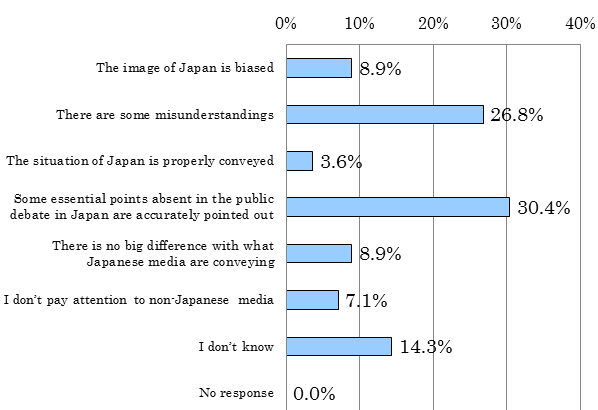
More than 60% believe in the role of media in resolving issues
As the world confronts a variety of issues, this survey asked journalists about the roles that media can play in resolving those issues. 60.7% of participants answered, "The media will have a very important role, and it can play a huge role in finding answers." In addition, no one selected "its role is already over."
However, while acknowledging the important role of the media, numerous journalists pointed to the limits of existing media. 33.9% of respondents answered, "It has an important role, however media these days it is already doing all it can."
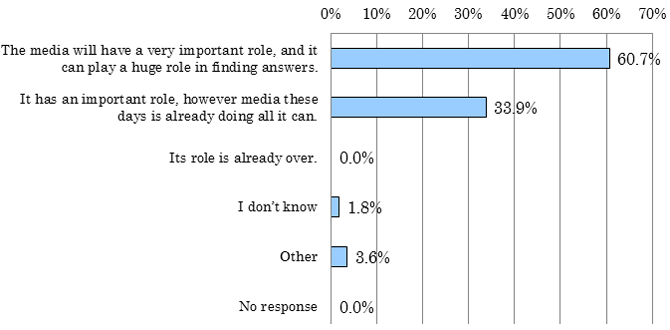
Over 80% believe that China should play a leadership role for peace in Northeast Asia
The next question asked journalists which country's leadership was necessary for establishing a system of peace in Northeast Asia. The most common response was China (80.4%), followed by Japan (62.5%) and the United States (48.2%). More than the U.S., many Japanese journalists want China and Japan to take the lead for peace in Asia.
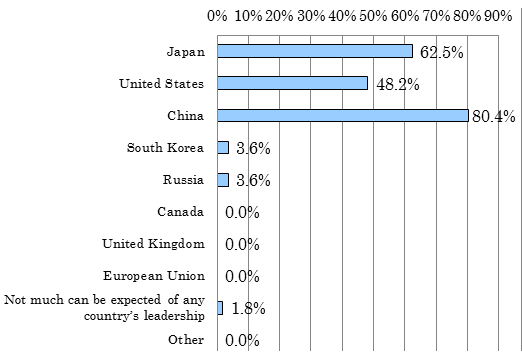
In 20 years, Japan will be an ageing society but still influential
Journalists were next asked, "What do you foresee Japan will be like 20 years from now?" Responses were concentrated on two answers: 83.9% answered "an ageing society" and 71.4% chose "shrunken down in economic scale, but still influential." This demonstrated that the majority of Japanese media professionals believe that Japan will be an ageing society in twenty years, but although it economy will shrink, Japan will still wield significant international influence. On the other hand, only 10.7% expressed the pessimistic view Japan would become "a small country in the Far East without any influence."
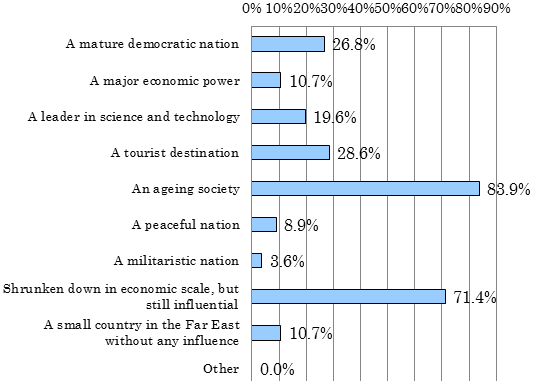
Japan should contribute to peace in Northeast Asia and progress in science and technology
Lastly, the survey asked journalists, "In which field(s) do you think Japan can play a major role in the world and Asia?" The two most common responses were "establishment of peace in Northeast Asia" (64.3%) and "technical and financial support for advancements in science and technology" (58.9%), each being selected by more than half of the participants. The next most common responses were "proactive investment in developing nations" (39.9%) and "nuclear non-proliferation" (33.9%).
However, even considering the major international threat of terrorist groups like ISIS today, only 1.8% of participants selected "measures against global terrorism." Although Prime Minister Abe continues to prioritize women's issues domestically, none of the participants selected "promoting the active participation of women in society."
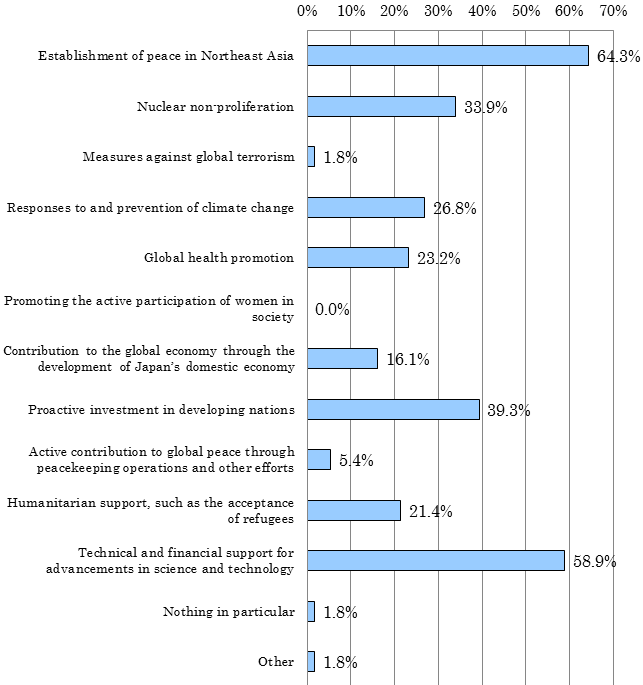
Post a comment